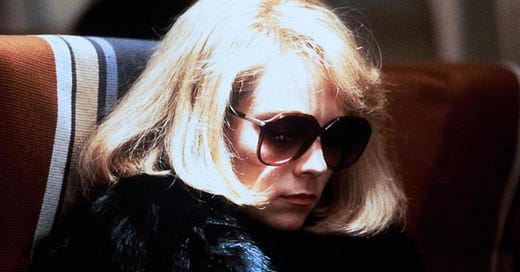There have been plenty of Noirs and Neo-Noirs that feature either femme fatales or female protagonists. There haven't been many where women take both roles and men are consigned to supporting characters and victims. Black Widow is one such rarity.
Justice Department analyst Alexandra Barnes (Debra Winger) is reviewing the death of a mafia don when she stumbles across a strange coincidence: the don died in their sleep of a rare disorder called Ondine's Curse and so did another man, a wealthy millionaire. As additional bodies pile up, she is convinced that a mystery woman is seducing, marrying, and killing rich men for their fortunes.
The movie follows the killer, 'Catherine' (Theresa Russell) as she changes her looks and identity and targets a new victim. She is shown doing extensive research to adopt a persona that allows her to get close to them and use her feminine wiles to seduce them. As soon as her target is dead and she has received their inheritance, she disappears to begin a new scheme.
Winger convinces her skeptical boss to allow her to go out into the field to try and track Russell down. She combs through data to come up with six suspects, from which she narrows down to the real killer. She flies to Seattle, where Russell has targeted a millionaire archaeologist. Posing as a reporter, Winger interviews the millionaire (played wonderfully by Nicol Williamson) but fails to warn him. She tries to get the local police interested in the case but she is dismissed for lack of evidence. Meanwhile, Russell has discovered that someone is on her trail; she tries and fails to confront her. Williamson dies, and Russell is back on the run.
Winger discovers clues that Russell may be traveling to Hawaii. She heads there and hires a sleazy private investigator to locate her. (played with delicious griminess by veteran character actor James Hong). Once Russell is found, Winger takes on the persona of a tourist and manages to get close enough to her to make friends and worm her way into her life.
Russell quickly figures out who she is however, and after a failed attempt to kill her during a scuba diving jaunt, she concocts a scheme to frame her for her new husband's murder. Winger is taken in by police, but turns the tables on Russell and delivers justice at the end.
Black Widow features a great selection of supporting actors: Terry Quinn, Dennis Hopper, Nicol Williamson, Diane Ladd, and there's even a cameo from master playwright David Mamet.
The cinematography was provided by veteran Conrad Hall. At various points, he drapes Russell in shadow, signaling her inner darkness and the mystery of her true identity.
Black Widow isn't perfect. The third act drags and the twist ending lacks punch. The final scheme and reversal is too complicated and lacks the deadly threat from the antagonist a good thriller demands. Winger is solid, but a better actress might have added layers of complexity to her character and better supported the hinted at themes.
But what elevates Black Widow is the performance of Theresa Russell. She delivers the cold-bloodedness required as a psychopathic killer but also the panic and anger of cornered prey. Her character adopts distinctly different personas (southern belle, brainy academic, wounded divorcee) and she inhabits each one convincingly while still hanging on to the real person underneath. She is sexy and believable as a seductress.
The movie also features an interesting and different female perspective. Both the protagonist and antagonist are women. Men are just targets for Russell and there are no husbands or boyfriends tying down Winger's character,. In fact, she is painted as a celibate, dedicated to her work at the cost of a personal life. She has to fend off male co-workers, including her boss. When the two of them collide at the end, there are hints of sexual tension between them. (Which could just be yet another tool of manipulation by the killer)
I have discussed the development of the Erotic Thriller previously (here). Black Widow doesn't fit the formula; 1987 was early in the genre. But it does feature a sexually powerful femme fatale, and a very strong one at that, thanks to Russell's performance. But it certainly fits into the flow of explicit, sexually driven Neo-Noirs that began with Body Heat in 1981 and progressed into a tidal wave of Erotic Thrillers in the 90s and early 2000s.
Given how the dominant female stereotype of the 1980s was a blonde bimbo with silicone breasts and massive, sky-high hair, credit should go to director Bob Rafelson and writer Ronald Bass for creating a sexually charged thriller that puts grounded and human female characters at the forefront of the story.
Supposedly Black Widow (2007) was a loose remake, but its status as a made for Lifetime TV movie left me uninterested in exploring its qualities or lack thereof.




